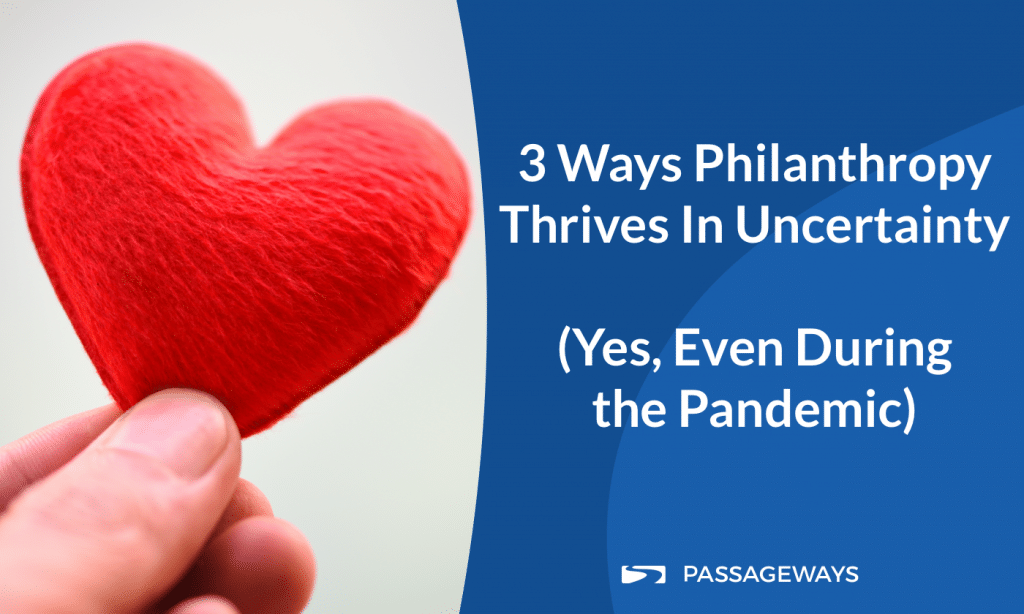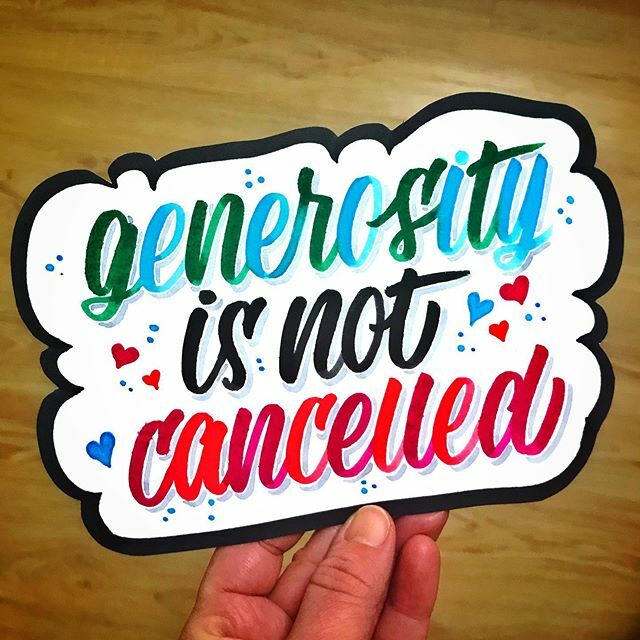
Here are two little-known facts about philanthropy and fundraising that defy conventional wisdom:
- During the Great Recession of 2007-2009), most foundations actually increased grant-making.
- In the year after the events of 9/11/2001, over $1 billion was raised in disaster relief. The stock market declined, but overall giving remained steady.
Both of these facts have immediate ramifications for today. While no community has been left untouched by the effects of the Covid-19 pandemic, nonprofits, in particular, have borne the brunt of the uncertainty left in its wake. To better understand how philanthropy and fundraising can continue in this changing landscape, we recently hosted a webinar with the amazing philanthropy expert, Angela E. White, CFRE, Senior Consultant and CEO of Johnson, Grossnickle and Associates. Angela shared some really powerful lessons that can have a tremendous, positive impact on nonprofits’ donor and charitable activities.
Key takeaways include:
- Lesson 1: Don’t Automatically Assume the Worst
- Lesson 2: Stay the Course
- Lesson 3: Utilize Your Board
Lesson 1: Don’t Automatically Assume the Worst
Let’s be honest. It’s not a pretty picture out there. There’s increasing numbers of coronavirus cases, rising unemployment, overburdened medical systems, travel restrictions, and more. You would be forgiven for assuming the worst and that charitable giving has stopped.
However, a look at recent survey results and other historical data paints a more optimistic picture:
- During COVID-19, 43% of donors continue to support the nonprofits that they usually support.
- 25% of donors give more to charity in 2020, and 54% plan to give at least the same amount.
- Younger generations (47.7% of millennials & 60.8% of Gen Z) plan to boost giving in 2020, as do residents of urban communities (36.9% vs. 23% of others).
The lesson is clear: don’t automatically assume the worst.
Lesson 2: Stay the Course
Sister Tracey Dugas of the Daughters of St. Paul tweeted this simple, but powerful message: Generosity is not Cancelled.

Inspired by Sister Tracey’s words, Angela also has a simple, but powerful message: “Stay the course. Don’t be tone deaf, but understand that your mission will outlast this crisis.”
Angela had more advice that echoed this theme:
- Donors do care about your mission and the impact of their financial support.
- Continue to tell your story, especially how your organization is responding to the COVID-19 crisis, its impact on those you serve, and your plans for re-entry and/or reopening.
- Don’t wait for the pandemic to end. Modify your functions and create new paths forward.
- Understand that you can’t control the pandemic. Focus on what you can control: outreach to donors and prospects.
The lesson is simple, but powerful: stay the course.
“Stay the course. Don’t be tone-deaf, but understand that your mission will outlast this crisis.”
Angela E. White, CFRE, Senior Consultant and CEO of Johnson, Grossnickle and Associates
Lesson 3: Engage Your Board
When conducting donor outreach, there’s no need for nonprofit staff to shoulder the responsibility alone. Nonprofits should fully engage and utilize their boards (e.g., directors, alumni, advisory, campaign cabinet) to connect with donors and move the relationships forward.
This advice also applies to communicating with key constituencies. When one organization wanted to keep its emeritus board members informed, the CEO held a Zoom call with the group. According to Angela, the event re-engaged a key constituency that might have been overlooked. “Former board members who participated loved it,” she said. “They got to see people they hadn’t seen in a while, and they felt like they were still a part of the institution and not forgotten.”
The lesson is clear: engage your board to move or re-establish key relationships.
Watch the Webinar Replay to Learn Even More
These were just three of the lessons that Angela White shared during the webinar. There was plenty more to be learned from this rich and thoughtful conversation, including:
- For donor campaigns, what you need to do to be flexible, but move forward.
- How to balance communications and outreach between short-term needs and the long-term future.
- What kind of alternative events you should consider when physical, in-person gatherings are no longer permitted or strongly discouraged.
About The Author

- At OnBoard, we believe board meetings should be informed, effective, and uncomplicated. That’s why we give boards and leadership teams an elegant solution that simplifies governance. With customers in higher education, nonprofit, health care systems, government, and corporate enterprise business, OnBoard is the leading board management provider.
Latest entries
 Board Management SoftwareJuly 26, 20225 Critical Board Engagement Survey Questions
Board Management SoftwareJuly 26, 20225 Critical Board Engagement Survey Questions Board Management SoftwareJuly 19, 2022What is an Advisory Council? (Overview, Roles, and Responsibilities)
Board Management SoftwareJuly 19, 2022What is an Advisory Council? (Overview, Roles, and Responsibilities) Board Management SoftwareJuly 15, 2022Balance Sheet vs. Income Statement: What’s the Difference?
Board Management SoftwareJuly 15, 2022Balance Sheet vs. Income Statement: What’s the Difference? Board Management SoftwareJuly 12, 2022Sweat Equity: Mark Haas of the Dallas Cup Board Gives a Nonprofit Play-by-Play for Success
Board Management SoftwareJuly 12, 2022Sweat Equity: Mark Haas of the Dallas Cup Board Gives a Nonprofit Play-by-Play for Success
